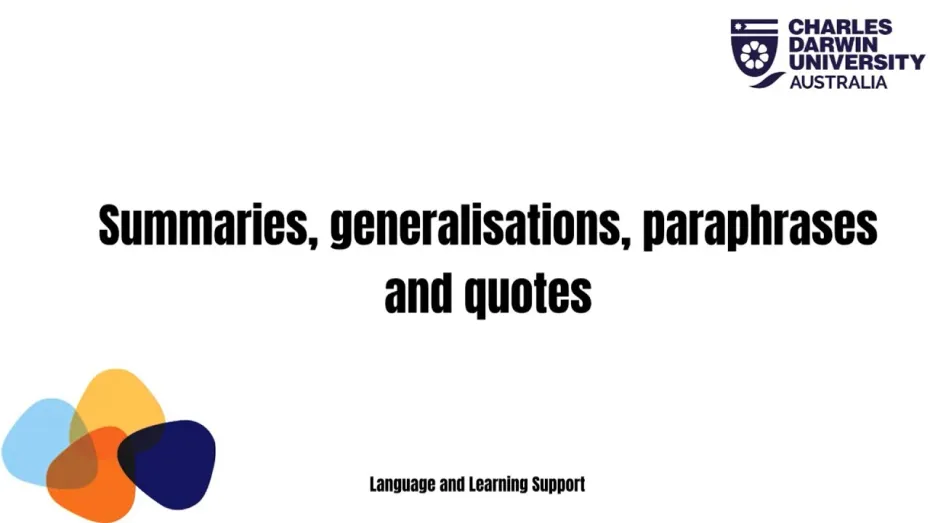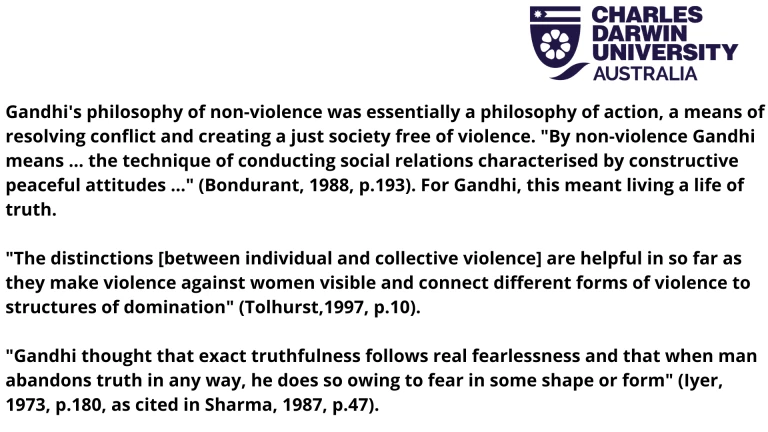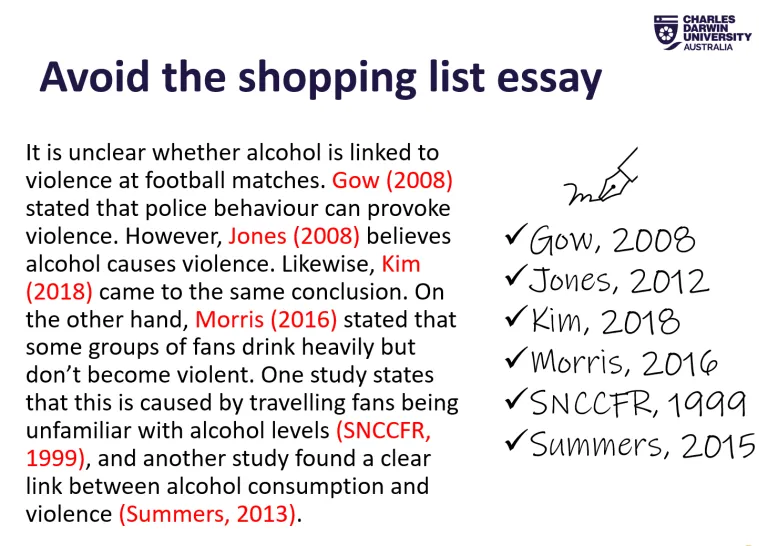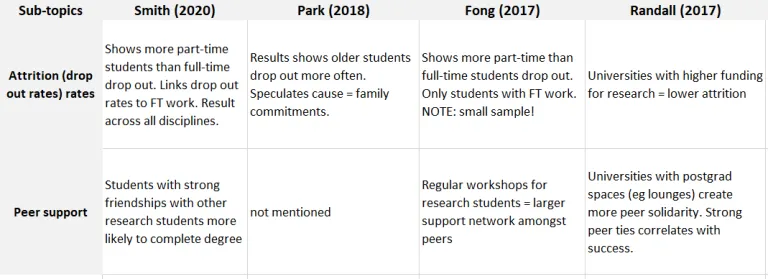When you write assignments at university, you refer to the ideas of the recognised experts in your subject area (discipline). This adds credibility to the ideas and information in your assignment. You may include the ideas of an expert in your text in four ways: summarising, generalising, paraphrasing, and quoting.
This page will help you to meet your lecturers' expectations by:
- self-evaluating your strengths and weaknesses
- considering the purpose of references in your writing
- using four strategies for referencing experts’ ideas to support your points
- identifying the features of a good summary, generalisation, paraphrase or quote
- synthesising references into your paragraphs.
Download this summary for your own reference.
Introduction to referring to the experts
All scholars refer to the work of other scholars in their writing. They are participating in a type of academic conversation that helps to build knowledge in their discipline. As a student, you also participate by referencing the experts you use to support your ideas.
Self evaluation
Before you continue, reflect on your previous writing experiences and the feedback you have received. How would you rate your ability in the following essay writing skills? Rate your ability from ‘good’ to ‘needs development’.
Reflect on your answers. Congratulations if you feel confident about your skills. You may find it helpful to review the materials on this page to confirm your knowledge and possibly learn more. Don't worry if your skills need development. All students need support at some stage and these materials will help.
Reasons for referencing experts
All students refer to the work of experts in their writing. These references play an important role for many reasons.
- How many reasons can you think of?
- What is not a good reason to refer to the experts?
An overview of referencing
Read the paragraph from an essay on football hooligans.
- As you read, think about how the student uses the evidence of experts to support the argument in the topic sentence.
- Click on the hot spots for an explanation.
Now, watch the video to learn more about the skills used to incorporate the work of experts into your writing.
Strategies for referring to the experts
To effectively refer to the experts in your writing, you need to master a range of skills.
Introduction to summarising and generalising
When you write a summary, you give your readers only the main idea or argument of your source. A summary is always much shorter than the original. In fact, the findings of quite long research reports could be summarised in only a couple of sentences.
When you are reading for your essays, you may find that several sources report very similar ideas. In that case, you needn’t write a separate summary for each. Instead, you can write a generalisation, or one summary, with all sources cited.
- Task: Summarising and generalising tips. Read the steps in creating an effective summary and flip the cards for handy hints.
Over to you:
Reread a paper that you need to summarise for one of your assignments.
Follow the seven steps and apply the handy hints.
Think: How useful are the steps and hints for you? What might you do differently in future?
Introduction to paraphrasing
Paraphrasing uses similar skills to summarising.
- Like a summary, you paraphrase by expressing another writer’s idea in your own words and citing the source.
- Unlike a summary, a paraphrase is usually about the same length as the original. This is because you are reporting on a detail from someone else’s work, not giving an overview of the work.
- Task: Exploring summarising skills. In this task, you will see extracts from original sources, followed by a student’s attempt to paraphrase. Read them carefully and identify problems with the paraphrases.
Over to you:
- Read an assignment that you are drafting for one of your units.
- Identify the paraphrases you have included. Have you avoided these pitfalls?
The paraphrasing process
If you are new to paraphrasing, this material will take you through the process. We recommend that you get comfortable and allow at least an hour so that you will benefit from the practice tasks.
Introduction to quoting
Quotes are used less frequently in academic writing than summaries, generalisations and paraphrases. This is because our focus is usually on the experts' ideas, not their words. You will only quote when you have a specific reason to use an expert’s words; otherwise, you should paraphrase.
When you quote, you must punctuate carefully. Read the three extracts in the image below and pay close attention to the punctuation.
- Task: Understanding of quote. Answer these questions about punctuating quotes. Refer to the examples above if you are not sure.
Over to you:
Read an essay that you are drafting for one of your units.
- Are your quotes necessary? Would a paraphrase be appropriate?
- Have you punctuated your quotes accurately?
Synthesising sources into your writing
After creating your summary or paraphrase, you must seamlessly synthesise it into your assignment.
Using your sources well
Students who are new to academic writing may write their essays like a list of summaries. A list of summaries makes your writing look like a shopping list of sources, like the paragraph below:
Remember that:
- your voice should present your ideas and arguments
- other voices—that is, the work of the experts—should support your ideas and arguments
- you can demonstrate your critical thinking by commenting on and drawing links between the sources.
Task: An essay on football hooligans analysis
- Reread the paragraph on football hooligans that you saw at the beginning of this material.
- Notice that the student categorised and presented the evidence in two groups: four papers that show a link with alcohol and two papers that don't.
- Click on the hotspots to remind yourself how the student uses generalising to draw links between sources with common findings. The student also uses summarising, paraphrasing and quoting.
Using a note-taking matrix
One way to find links between the papers you read is to make notes in a table or matrix. You can learn more about using a note-taking matrix from The Thesis Whisperer.
One student has researched the topic of success in post-graduate studies. They have created a matrix for storing their notes. A matrix is organised in this way:
- Each column is for an article that the student has read.
- Each row is for a sub-topic or idea.
In this matrix, the student has put notes about attrition (drop out rates) in row one. In row two, the student has put notes on peer support for students.
When the student wrote about attrition, they first read along the row. They compared the information, and noted how the different sources agreed or disagreed with each other. Then, they synthesised this information into their paragraphs.
- Task: Practicing synthesis with in-text references. Read the paragraph the student has created from these notes and pay attention to how the sources have been synthesised into the text. Insert the missing in-text references by cutting and pasting them into the boxes.
Now, you try.
- Read the row in the matrix that focuses on peer support.
- Note how the different sources agree or disagree with each other.
- Draft a paragraph that synthesises the relevant sources.
- Compare paragraphs with a peer.
- Compare your paragraph with the sample in Over to you.
Over to you
Compare your paragraph with this sample:
| Attrition rates in postgraduate students appear to be linked to available peer support, which helps to build a sense of connection and belonging at university. Research suggests that students with strong peer relationships are more likely to persist in their studies to successfully complete their degrees (Randall, 2017; Smith, 2020). Universities can facilitate these relationships by offering support workshops, which not only equip students with the necessary study skills, but also help create support networks (Fong, 2017). They can also offer common areas, such as lounges, where students can meet their peers (Randall, 2017). Each of these initiatives can contribute to building peer communities that enable success. |
Remember: your paragraph will be different to this sample. What is important is that you have created a cohesive paragraph with:
- a topic sentence that announces the main message of the paragraph
- evidence offered by the experts and cited
- evidence that is synthesised into the body of the paragraph, not summarised in a list.
1. Here is a matrix that you can download and adapt:
2. Read an assignment you are drafting for one of your units.
- Does your voice control the arguments?
- Have you made clear links between the sources that you have used to support your arguments?
- Have you commented on the evidence that you have used to support your arguments?
Applying your learning
Reflect on what you have learned in this material and consider how you can use it in your own work.
Useful strategies
Think about your own work now and consider how you can apply what you have learnt in this material.
| 1 | Remember that reading is the first step in summarising and paraphrasing. So, you should focus on developing your reading skills.
|
| 2 | Re-read an essay you have previously written focusing on how you have used the work of the experts. How effectively have you used the techniques in this material? |
| 3 | Exchange drafts with a peer and give each other feedback.
|
| 4 | Be very careful with referencing. The referencing style that you use depends on the expectations of your lecturer, so always check first. |
Next steps
Reflect on your learning
- Revisit the self-analysis quiz at the top of the page. How would you rate your skills now?
- Remember that writing is a process and mistakes aren't a bad thing. They are a normal part of learning and can help you to improve.
If you would like more support, visit the Language and Learning Advisors page.
Did you know CDU Language and Learning Advisors offer a range of study support options?
https://www.cdu.edu.au/library/language-and-learning-support




